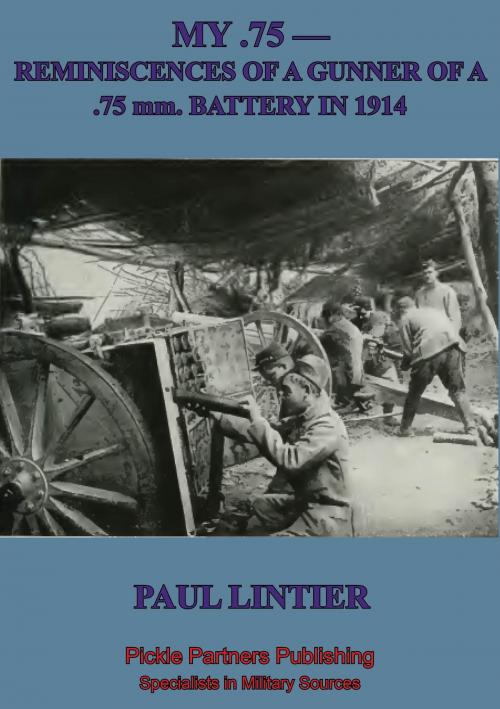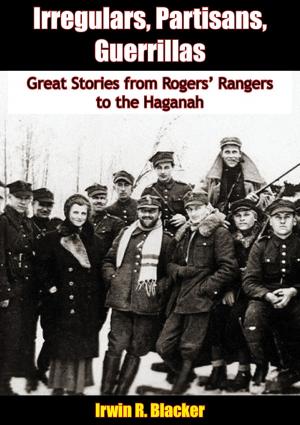MY .75 —Reminiscences Of A Gunner Of A .75 Mm. Battery In 1914
Nonfiction, History, Military, World War I, Germany, British| Author: | Paul Lintier | ISBN: | 9781782891970 |
| Publisher: | Lucknow Books | Publication: | June 13, 2014 |
| Imprint: | Lucknow Books | Language: | English |
| Author: | Paul Lintier |
| ISBN: | 9781782891970 |
| Publisher: | Lucknow Books |
| Publication: | June 13, 2014 |
| Imprint: | Lucknow Books |
| Language: | English |
The renowned military correspondent of the Times Cyril Falls awarded this memoir two of his coveted stars (of three stars possible) and described it as follows:
“** - Paul Lintier, a young field artilleryman doing his service when war broke out, kept a journal until the 22nd September when he was wounded, which is among the finest documents of its kind ever published. He is one of the few writers whose powers of description and of self-analysis are equally great. His battery was in the French IV Corps, and took part in the disastrous action of Virton. The details of the defeat, the pictures of the shaken infantry and of the roads blocked by fleeing country people, are wonderfully good. But defeat was not to be his sole experience. The exhausted battery was suddenly entrained with its division and moved through Paris to the left flank, where it formed part of General Maunoury’s Army, and on the 9th September for the first time "got its own back" firing over open sights upon the enemy in mass. Then came the wild joy when it was discovered that the enemy had broken off the action. The advance to the Aisne followed. Just before Lintier was wounded there was another desperate action, in the course of which the battery was firing at a range of 800 metres. On returning to the front Lintier kept another journal, which was found on his body when he fell in action.”—Cyril Falls, War Books, London 1930.
The renowned military correspondent of the Times Cyril Falls awarded this memoir two of his coveted stars (of three stars possible) and described it as follows:
“** - Paul Lintier, a young field artilleryman doing his service when war broke out, kept a journal until the 22nd September when he was wounded, which is among the finest documents of its kind ever published. He is one of the few writers whose powers of description and of self-analysis are equally great. His battery was in the French IV Corps, and took part in the disastrous action of Virton. The details of the defeat, the pictures of the shaken infantry and of the roads blocked by fleeing country people, are wonderfully good. But defeat was not to be his sole experience. The exhausted battery was suddenly entrained with its division and moved through Paris to the left flank, where it formed part of General Maunoury’s Army, and on the 9th September for the first time "got its own back" firing over open sights upon the enemy in mass. Then came the wild joy when it was discovered that the enemy had broken off the action. The advance to the Aisne followed. Just before Lintier was wounded there was another desperate action, in the course of which the battery was firing at a range of 800 metres. On returning to the front Lintier kept another journal, which was found on his body when he fell in action.”—Cyril Falls, War Books, London 1930.


![Cover of the book Love Letters From An Anzac [Illustrated Edition] by Paul Lintier](https://www.kuoky.com/images/2014/august/300x300/9781782892571-pKQI_300x.jpg)




![Cover of the book Adventures Of An Ensign [Illustrated Edition] by Paul Lintier](https://www.kuoky.com/images/2015/november/300x300/9781786255617-DmjT_300x.jpg)
![Cover of the book U122: The Diary of a U-Boat Commander [Illustrated Edition] by Paul Lintier](https://www.kuoky.com/images/2015/november/300x300/9781786255433-3OF4_300x.jpg)

![Cover of the book "En L'air!" (In The Air) Three Years On And Above Three Fronts [Illustrated Edition] by Paul Lintier](https://www.kuoky.com/images/2012/april/300x300/9781782890836-VLpO_300x.jpg)


![Cover of the book A Soldier Of The Sky [Illustrated Edition] by Paul Lintier](https://www.kuoky.com/images/2012/april/300x300/9781782890706-MNMw_300x.jpg)
![Cover of the book The Emma Gees [Illustrated Edition] by Paul Lintier](https://www.kuoky.com/images/2015/november/300x300/9781786255501-8RDw_300x.jpg)
![Cover of the book The 101st Airborne Division’s Defense Of Bastogne [Illustrated Edition] by Paul Lintier](https://www.kuoky.com/images/2014/august/300x300/9781782893790-VOw1_300x.jpg)